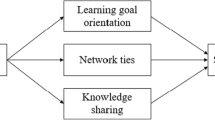Abstract
Colleges and universities in the United States have developed and implemented a wide array of opportunities for undergraduate students to learn about innovation and entrepreneurship. Drawing upon an institutional case study, this article examines why one public research university initiated and supported curricular and co-curricular offerings in an effort to engage all students in innovation and entrepreneurship. Four rationales drawn from 31 interviews are presented: perceived labor market demands, student interest, private donations, and competition with other institutions. These rationales are analyzed and connected to conceptual perspectives on the formation and transformation of curricula in higher education.
Similar content being viewed by others
References
Altbach, P. G. (1991). The racial dilemma. In P. G. Altbach & K. Lomotey (Eds.), The racial crisis in American higher education (pp. 3–17). Albany, NY: State University of New York Press.
Bastedo, M. N. (2005). Curriculum in higher education: The historical roots of contemporary issues. In P. G. Altbach, R. O. Berdahl, & P. J. Gumport (Eds.), American higher education in the twenty-first century: Social, political, and economic challenges (pp. 465–485). Baltimore, MD: The Johns Hopkins University Press.
Berman, E. P. (2012). Creating the market university: How academic science became an economic engine. Princeton, NJ: Princeton University Press.
Bogdan, R. C., & Biklen, S. K. (2003). Qualitative research for education: An introduction to theories and methods (4th ed.). New York, NY: Pearson Education Group.
Brint, S., Riddle, M., Turk-Bicakci, L., & Levy, C. S. (2005). From the liberal to the practical arts in American colleges and universities: Organizational analysis and curricular change. Journal of Higher Education, 76, 152–180.
Clark, B. R. (1998). Creating entrepreneurial universities: Organizational pathways of transformation. Oxford, United Kingdom: IAU Press and Pergamon.
Clark, C. (2002). Effective multicultural curriculum transformation across disciplines. Multicultural Perspectives, 4(3), 37–46.
Cutrer, E. M. (2005). Student social entrepreneurs: A classroom call to action. Peer Review, 7(3), 27–28.
Eagan, K., Stolzenberg, E. B., Ramirez, J. J., Aragon, M. C., Suchard, M. R., & Hurtado, S. (2015). The American freshman: National norms fall 2014. Los Angeles, CA: Higher Education Research Institute, UCLA.
Etzkowitz, H., & Leydesdorff, L. (Eds.). (1997). Universities in the global knowledge economy: A triple helix of university-industry-government relations. London, England: Pinter.
Ewing Marion Kauffman Foundation (2006). Entrepreneurship in American higher education. Retrieved from http://www.kauffman.org/uploadedfiles/entrep_high_ed_report.pdf
Geiger, R. L. (1993). Research and relevant knowledge: American research universities since World War II. Oxford, United Kingdom: Oxford University Press.
Geiger, R. L., & Sá, C. M. (2008). Tapping the riches of science: Universities and the promise of economic growth. Cambridge, MA: Harvard University Press.
Ginsberg, B. (2011). The fall of the faculty: The rise of the all-administrative university and why it matters. Oxford, United Kingdom: Oxford University Press.
Gumport, P. (2002). Academic pathfinders: Knowledge creation and feminist scholarship. Westport, CT: Greenwood Press.
Hedges, E. (1996). Curriculum transformation: A brief overview. Women’s Studies Quarterly, 24(3/4), 16–22.
Jessop, R. (2008). Cultural political economy of competitiveness and its implications for higher education. In R. Jessop, N. Fairclough, & R. Wodak (Eds.), Education and the knowledge-based economy in Europe (pp. 13–39). Rotterdam, The Netherlands: Sense.
Katz, J. (2003). The chronology and intellectual trajectory of American entrepreneurship education, 1876–1999. Journal of Business Venturing, 18, 283–300.
Katz, J. (2004). 2004 survey of endowed positions in entrepreneurship and related fields in the United States. Kansas City, MO: Ewing Marion Kauffman Foundation.
Kuratko, D. F. (2005). The emergence of entrepreneurship education: Development, trends, and challenges. Entrepreneurship: Theory and Practice, 29, 577–597.
Leslie, L., & Brinkman, P. (1988). The economic value of higher education. New York, NY: The American Council on Education/Macmillan.
Mars, M. M. (2006). The emerging domains of entrepreneurship education: Students, faculty, and the capitalist academy (Unpublished doctoral dissertation). University of Arizona, Tucson, AZ.
Mars, M. M., & Metcalfe, A. S. (2009). The entrepreneurial domains of American higher education. ASHE Higher Education Report, 34(5). San Francisco, CA: Jossey-Bass.
Mars, M. M., & Rhoades, G. (2012). Socially oriented student entrepreneurship: A study of student change agency in the academic capitalism context. Journal of Higher Education, 83, 435–459.
Mars, M. M., Slaughter, S., & Rhoades, G. (2008). The state-sponsored student entrepreneur. Journal of Higher Education, 79, 638–670.
McCarthy, E. D. (1996). Knowledge as culture: The new sociology of knowledge. London, England: Routledge.
Menzies, T. V. (2004). Entrepreneurship and the Canadian universities. St. Catherine’s, ON, Canada: Brock University.
Merriam, S. B. (1998). Qualitative research and case study applications in education. San Francisco, CA: Jossey-Bass.
O’Meara, K. (2007). Striving for what? Exploring the pursuit of prestige. In J. C. Smart (Ed.), Higher education: Handbook of theory and research, VXXII (pp. 121–179). New York, NY: Springer Press.
Office of the Provost Announcements (2013, January 28). Retrieved from http://www.provost.xxx.edu/announcements/Innov_Entre.cfm (Institution blinded)
Safranski, S. R. (2004). The growth and advancement of entrepreneurship education: An environmental scan. The Academy of Management Learning and Education, 3, 340–342.
Selingo, J. J. (2013). College (un)bound: The future of higher education and what it means for students. Boston, MA: New Harvest.
Slaughter, S. (1997). Class, race and gender and the construction of postsecondary curricula in the United States: Social movement, professionalization and political economic theories of curricular change. Journal of Curriculum Studies, 29, 1–30.
Slaughter, S. (2002). The political economy of curriculum-making in American universities. In S. Brint (Ed.), The future of the city of intellect: The changing American university (pp. 260–289). Stanford, CA: Stanford University Press.
Slaughter, S., & Rhoades, G. (2004). Academic capitalism and the new economy: Markets, state, and higher education. Baltimore, MD: The Johns Hopkins University Press.
Solomon, G. T., Duffy, S., & Tarabishy, A. (2002). The state of entrepreneurship education in the United States: A nationwide survey and analysis. International Journal of Entrepreneurship Education, 1(1), 65–86.
Stake, R. E. (2000). Case studies. In N. K. Denzin & Y. S. Lincoln (Eds.), Handbook of qualitative research (2nd ed., pp. 435–454). Thousand Oaks, CA: Sage.
Strauss, A., & Corbin, J. M. (1990). Basics of qualitative research: Grounded theory procedures and techniques. Thousand Oaks, CA: Sage.
Titus, M. A. (2009). The production of bachelor’s degrees and financial aspects of state higher education policy: A dynamic analysis. Journal of Higher Education, 80, 439–468.
United States Department of Commerce (2013). The innovative and entrepreneurial university: Higher education, innovation and entrepreneurship in focus. Washington, DC: Office of Innovation and Entrepreneurship, Economic Development Administration.
Volkmann, C. (2004). Entrepreneurship studies—an ascending academic discipline in the twenty-first century. Higher Education in Europe, 29, 177–185.
Washburn, J. (2005). University, Inc.: The corporate corruption of American higher education. New York, NY: Basic Books.
Yin, R. K. (1994). Case study research: Design and methods (3rd ed.). Thousand Oaks, CA: Sage.
Author information
Authors and Affiliations
Corresponding author
Rights and permissions
About this article
Cite this article
McClure, K.R. Exploring Curricular Transformation to Promote Innovation and Entrepreneurship: An Institutional Case Study. Innov High Educ 40, 429–442 (2015). https://doi.org/10.1007/s10755-015-9325-8
Published:
Issue Date:
DOI: https://doi.org/10.1007/s10755-015-9325-8




